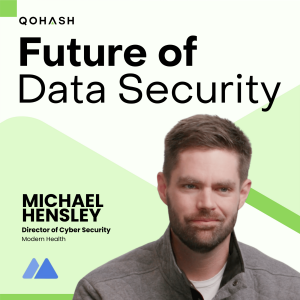
Thursday Jun 05, 2025
EP 17 — Modern Health’s Michael Hensley on Healthcare Security Beyond HIPAA Compliance Checkboxes
The healthcare industry's digital transformation has created unprecedented opportunities for patient care delivery, but it's also introduced complex security challenges that extend far beyond traditional compliance frameworks. Michael Hensley, Director of Cyber Security at Modern Health, brings a unique perspective to protecting private — and heavily regulated — health data while maintaining the innovation velocity essential for startup success. Healthcare security teams must balance regulatory requirements with business agility, creating frameworks that protect patients without stifling innovation.
Michael's journey from professional musician to software engineer to cybersecurity leader shaped his understanding that effective security programs prioritize people and processes alongside technology investments. His approach demonstrates how healthcare organizations can build security frameworks that enable rather than restrict innovation, creating speedy review processes for new technologies while maintaining rigorous patient data protection standards. His conversation with Jean also explores the evolving landscape of healthcare cybersecurity, from shadow AI risks to the misconceptions surrounding HIPAA compliance.
Topics discussed:
- The fundamental difference between healthcare cybersecurity and other industries, focusing on real-world patient impact rather than just financial or reputational damage from data breaches.
- Common misconceptions about HIPAA compliance, including the regulation's flexibility and how organizations must interpret general requirements based on their specific business models and patient populations.
- How telehealth expansion created new security paradigms, enabling rapid service deployment through cloud-native platforms while introducing risks from easy misconfigurations and third-party integrations.
- Shadow AI emergence in healthcare environments where employees seek productivity gains through unauthorized AI tools, potentially exposing patient data to non-compliant platforms without understanding regulatory implications.
- Organizational strategies for safe AI adoption in regulated industries, including dedicated review processes, governance committees, and internal tool development that unlocks productivity while maintaining compliance.
- The evolution from traditional on-premises healthcare security models to cloud-native architectures where services can be deployed with minimal friction but require sophisticated guardrails to prevent data exposure.
- Advanced approaches to vendor risk management in healthcare technology, balancing the need for third-party integrations with rigorous security and compliance vetting processes.
- Why effective cybersecurity programs treat people and processes as equally important to technology investments, focusing on ownership models and operational sustainability rather than just tool deployment.
- Building security teams that enable business objectives through speedy review processes and treating compliance requests as first-class problems rather than obstacles to innovation.
No comments yet. Be the first to say something!